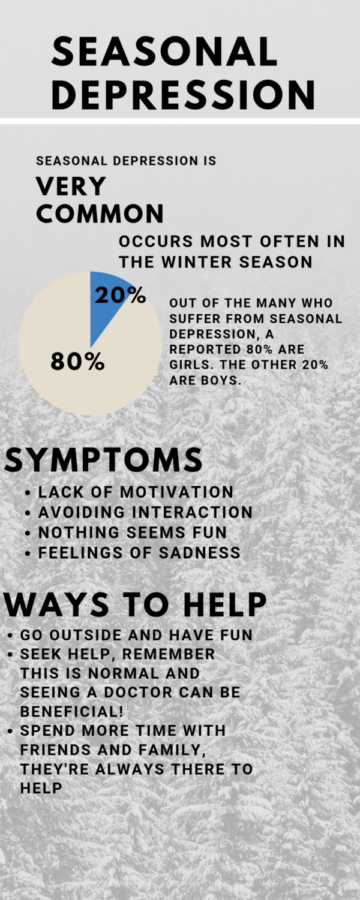Seasonal Depression Poses A Threat To Teens
December 21, 2018
A student sitting alone in their room feels nothing but the impossible to lift the weight of their blankets and pillows on their body and mind. The weather gets colder and the days get shorter. With the darker afternoons, it feels as though the day is not the only thing that is getting darker. This is how one student describes her experience with seasonal depression.
It is not uncommon for teenagers and young adults to feel an increase, or completely new depression in the fall and winter months. Although many things like school and family could be a factor, the dramatic increase in depression is primarily due to the change in the weather and the amount of sunlight hours during the day.
The decrease in sunlight has a high chance to disrupt an individual’s biological clock or circadian rhythm that tells a person when they are supposed to be tired or at full energy. It is true that episodes of seasonal depression can occur in the summer but it is much more likely for an individual to experience long lasting periods of sadness during winter.
Highland junior Sofi Kenrick describes depression as the total lack of motivation to even do something as mundane as getting out of bed. Things people love all turn into chores that just need to get done before they can go back to bed. It is common to act reckless or erratic and have seemingly no regard for personal well being.
“If all you had to eat for the rest of your life was mashed potatoes. Mashed potatoes are great..For like one serving, but then if you keep eating it for the rest of your life it becomes tasteless and boring,” Kenrick says, “That is all depression is. It makes life seem like there is nothing fun or happy any more.”
It can be especially hard at school; a common feeling of depression is not wanting to interact with people at all. Being forced by law to attend a school of thousands of students of the same age can be a challenge. Kenrick says the hardest part about being depressed is having to interact with people, even close friends.
“You will get these episodes where you just don’t want to go out, and people will think that you just hate them,” Kenrick says.
Although depression is a sensitive topic that many are not comfortable discussing, raising awareness of just how common depression is has been a priority in recent years in middle and high schools. The idea is that teens won’t feel that something is uniquely wrong with them if they experience depression, while also providing tools to recognize and treat the condition.
For many students, it seems as though there is no one there to help with these seasonal issues, but this is not the case. Despite the fact that talking to someone in a constructive way can be the hardest part of the process, Highland tries to battle this issue by making it easier than ever to talk to a professional. Highland even has a mental health specialist assigned to the school (she can be found in the counseling center).
Depression is almost four times more common in females than males. In fact, 80 percent of all people who have reported symptoms of seasonal depression are female. This is not to say that it is not still common for adolescent males to experience depression, periodically. Estrogen and progesterone, which only appear in females, have been shown to react more strongly with mood disorders such as depression and anxiety. Additionally, males are less likely to report feelings of sadness.
One of the most difficult aspects of depression is realizing that an individual may suffer from it. It is scary for many to acknowledge that they may have a problem. It can be even scarier to try and get help. Despite all this fear, Kenrick is happy she finally reached out and received help.
“I didn’t want to be diagnosed at first. I kind of makes you feel broken almost. People look at you differently. But what I actually got diagnosed it was actually really life changing. I have been able to be better in general. Now I do sometimes want to get out of bed and I do want to go out with my friends,” Kenrick said.
It may appear difficult at first to seek help but it can extremely beneficial. Although it may be important it is not always necessary to seek the help of a mental health specialist. Julie Winn, a therapist at Valley Behavioral Health, says that it is critical to seek professional help for anyone who starts to experience symptoms so severe that their life is in danger. But there are at-home remedies that can help during difficult times as well.
“Just get out and do something. With depression, one tends to isolate themselves quite a bit, so getting active and spending time with family members is the best way to combat seasonal depression,” Winn said.





























